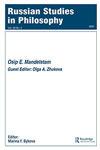回到自我辩护的问题。黑格尔和费尔巴哈的落脚点……
IF 0.1
4区 哲学
Q4 Arts and Humanities
引用次数: 0
摘要
摘要在这篇长篇节选中,Bibler认为,在黑格尔的逻辑中,思维吞噬了对象——绝对实现了——因此思维本身就消失了。然而,思维必然涉及存在,即使它以不同的逻辑表达。在这一点上,研究转向了关于各种逻辑相互作用的问题。与此相反,Bibler声称,在证明每个逻辑的开始时,不需要元逻辑。黑格尔并没有对这个问题进行阐述;因此,他的逻辑是有目的的。同样,黑格尔也没有逻辑起点的理由,因为纯粹的存在与无不包含矛盾。费尔巴哈试图引入对话,但他的对话是思想家与自己的对话,而不是“我”与“你”的对话;因此,它不包括他者,因此,它不是一个真正的对话。费尔巴哈拒绝接受这种重复,不理解对话者的作用,因此他的逻辑也是单逻辑的。困难在于试图将存在引入逻辑,只有当逻辑以不同的方式表述时,这才有可能。因此,Bibler提出了一种不同的逻辑,一种存在的逻辑,他将其解释为非知识的逻辑,非理解的逻辑。无法理解的是没有其他类型的推理。例如,中世纪基于宗教的推理及其解释。在其中,世界不是被理解为客体,而是被理解为上帝固有的。在现代欧洲思想中,当一个人思考时,正如康德所写:“无条件存在于事物中,因为我们不知道它们。”在这方面,《圣经》赞扬了库萨的尼古拉斯的逻辑,他在解释中包括了科学上的无知。笛卡尔和斯宾诺莎逻辑的价值也在这里被简要地检验,以及向证明一种新逻辑的转变。本文章由计算机程序翻译,如有差异,请以英文原文为准。
Back to the Problem of Self-Justification. Where Hegel and Feuerbach Left Off . . .
ABSTRACT In this long excerpt, Bibler argues that, in Hegel’s logic, thinking devours the object—the Absolute is achieved—and therefore thinking itself disappears. Yet thinking necessarily involves being, even though it is expressed in a different logic. At this point, the inquiry shifts to the question about the interaction of various logics. Contrary to this, Bibler claims that no meta-logic is required when it comes to justifying the beginning of each logic. This issue was not explicated in Hegel; therefore, his logic has an end. Similarly, Hegel had no rationale for the beginning point of logic, because pure being and nothing do not contain contradictions. Feuerbach tried to introduce dialogue, but his dialogue is that of the thinker with himself, not a dialogue between “I” and “You”; therefore, it does not include the Other and, thus, is not a true dialogue. Rejecting this Duplicate, Feuerbach did not understand the role of the Interlocutor, and so his logic is also mono-logical. The difficulty lies in the attempt to introduce being into logic, and this is possible only if logic is formulated in a different way. Thus, Bibler proposes a different logic, a logic of being, which he interprets as the logic of non-knowledge, the logic of non-understanding. What escapes understanding is no other type of reasoning. For example, medieval reasoning based on religion and its explanations. In it, the world is understood not as object but as inherent in God. In modern-era European thought, when one thinks, one just as necessarily includes both what one understands and what one does not understand in one’s knowledge of the object, as Kant wrote: “The unconditional is located in things, because we do not know them.” In this regard, Bibler praises the logic of Nicholas of Cusa, who includes scientific ignorance in his explanations. The value of Descartes’ and Spinoza’s logics are also briefly examined here, along with the transition to justifying a new logic.
求助全文
通过发布文献求助,成功后即可免费获取论文全文。
去求助
来源期刊

RUSSIAN STUDIES IN PHILOSOPHY
PHILOSOPHY-
CiteScore
0.10
自引率
0.00%
发文量
14
期刊介绍:
Russian Studies in Philosophy publishes thematic issues featuring selected scholarly papers from conferences and joint research projects as well as from the leading Russian-language journals in philosophy. Thematic coverage ranges over significant theoretical topics as well as topics in the history of philosophy, both European and Russian, including issues focused on institutions, schools, and figures such as Bakhtin, Fedorov, Leontev, Losev, Rozanov, Solovev, and Zinovev.
 求助内容:
求助内容: 应助结果提醒方式:
应助结果提醒方式:


